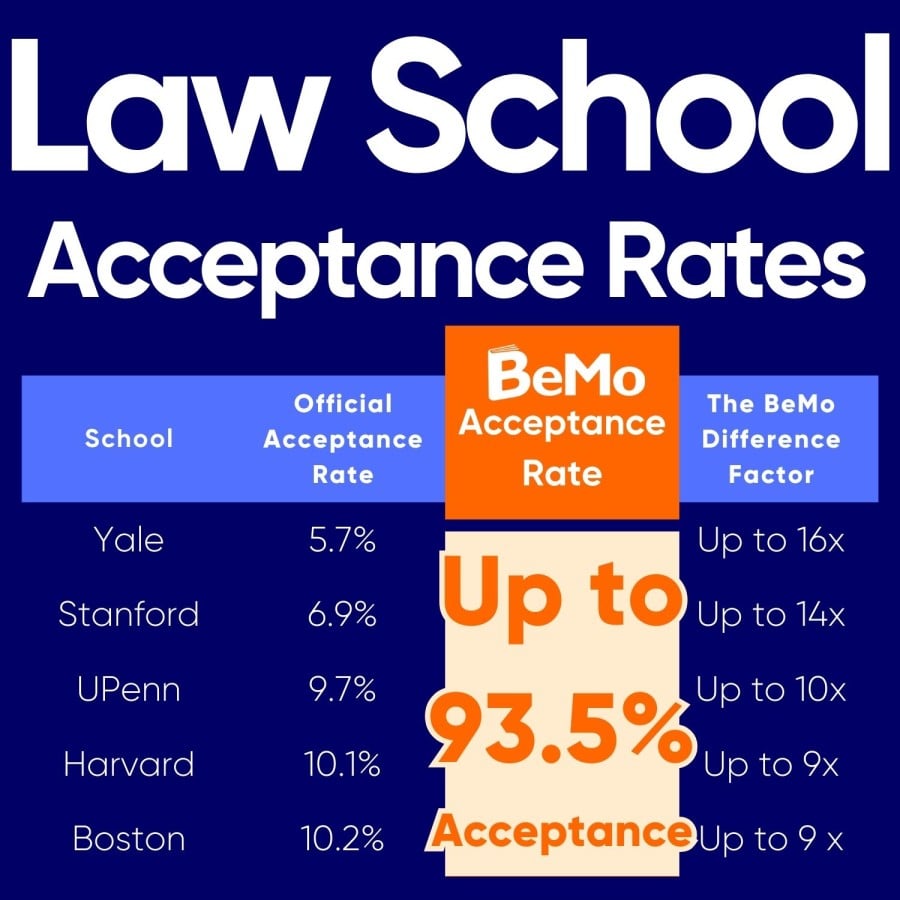When looking at law school acceptance rates, it’s easy to feel overwhelmed, considering the highly competitive nature of US law schools. But despite the selective nature of these schools, it is possible to craft a winning application to any of them. In this blog, we’ll explore how competitive admissions are at US law schools, selection factors, how to improve your chances of getting accepted, and some tips on how to prepare for law school applications.
>>Want us to help you get accepted? Schedule a free initial consultation here <<
Listen to the blog!
Law School Acceptance Rates

If you’re interested in applying for law school in Canada, take a look at some law schools in Canada statistics and admissions requirements. You can also familiarize yourself with the OLSAS application, as many of Canada’s best law schools are located in Ontario.
How Competitive Are Law School Acceptance Rates?
The median acceptance rate for all law schools in the US sits at 41%, which is already a fairly competitive rate.
The top 15 law schools in the US, such as the T14 law schools with acceptance rates below 20%, are even more selective.
The toughest law school to get into, Yale Law School, has an acceptance rate of just 5.72%. Conversely, even the easiest Ivy League law schools to get into, such as Cornell Law School, Columbia's law program and UPenn Law School have very competitive acceptance rates.
Getting into law school in the US is undeniably challenging, but it is possible. If you’re concerned about how to get into law school with a low GPA or below average LSAT score, don’t worry. There are ways to compensate for lower statistics and get in.
What GPA and LSAT Score Do You Need to Get Into Law School?
To get accepted to law school, you’ll need an excellent application, a high GPA (above 3.3) and good scores; including an LSAT score between 150 and 160 to be considered for competitive programs.
A law school advisor can help guide you in navigating this really difficult law school requirement. They can help you figure out how to study for the LSAT to get a competitive score—for students who score below 145, a retake is typically necessary. Adequate prep and expert advice can help avoid this type of scenario!
Here's some tips for those who are trying to get into law school with lower grades:
Law School Acceptance Rates: What They Mean and Why Your LSAT Score & GPA Matter
For law school admissions, acceptance rates provide a general sense of a school’s selectivity. However, the median GPA and LSAT scores of admitted students are often far more critical indicators of competitiveness—and these have risen across the board in recent years. This isn’t limited to Ivy League or top-tier schools; it reflects the increasing competition at all U.S. law schools.
So, how much do GPA and LSAT scores matter? Quite a lot. As Aaron Schulze, JD graduate of the The University of Texas School of Law, explains:
“When I was applying, I was told by multiple sources that an applicant’s ‘numbers’ (GPA and LSAT) were always the most significant factors. Of course, the written parts of the application are important, but they are not weighed the same. While strong scores can make up for weak written materials, strong written materials can rarely make up for weak scores.” - Aaron Schulze, JD
Tyler Chiasson, JD graduate and LSAT expert, echoes this sentiment:
“[A] personal statement may push a student over the finish line to acceptance, but I don’t think it’s given as much importance – I did not do much to personalize my personal statements to each school but got many acceptances anyway.” - Tyler Chiasson, JD
This is not to say the rest of your application doesn’t matter—of course it does! But for the most competitive schools, a low GPA and LSAT score are hard to overlook, even if the rest of your application is stellar. To put it bluntly: your numbers get you into the game, while the other components—your personal statement, letters of recommendation, and resume—help you stand out once you’re there.
How to Use Law School Acceptance Rates and Admissions Data
Understanding a school’s acceptance rates and admissions statistics can help you make strategic decisions about where to apply. Here’s how JD expert Aaron Schulze approached it:
“I spent a considerable amount of time researching and finding all the metrics (i.e., average GPA, average LSAT, etc.) for the schools I was interested in. Because I was unsure of where I wanted to practice, I wanted to apply to recognized, more notable programs with a reputation both in-state and out-of-state. However, these programs were more competitive. I divided my school list into categories of how likely my acceptance would be based on comparing my numbers with the school’s statistics.” - Aaron Schulze, JD
This strategy works because it’s realistic and focused. Start by comparing your GPA and LSAT scores to the median scores of the schools you’re targeting. If your numbers are a strong match (or above), that’s a green flag. If you’re slightly below, you’ll need to compensate with exceptional personal statements, strong letters of recommendation, or unique experiences.
The good news? You don’t need to hunt for these stats—they’re all provided above in this blog! Once you’ve identified the schools where you’re a competitive applicant, you can shift focus to crafting the rest of your application to stand out from the crowd. Remember, every other applicant will also have strong numbers, so you need to show something extra.
Want some extra tips on getting accepted to your dream Law School? Check out this video:
How to Increase Your Law School Acceptance Chances
It goes without saying that for the best chance at getting into law school, you’ll need a well-rounded application. This means a respectable LSAT score, the highest GPA possible, and a compelling law school personal statement.
Having a good balance of all application components is best, but a weak point in your application can be overcome by a solid whole. Having a really strong application is especially important if you have lower statistics. The following components are just as vital as a high GPA:
Submit Strong Law School Essays
Your law school personal statement will answer the question “why do you want to study law?” and why you’ve chosen to apply to a particular law school. Some applications may include specific law school essay prompts you need to respond to, so review the law school admissions essay topics you’ll be writing on to help you construct a strong essay and brainstorm ideas.
Many students struggle with the written sections of an application, particularly law school essays, and plenty of students hire a grad school essay tutor for this reason. Reading examples can be an excellent way to prepare for this step, too. Try reading some Harvard Law School personal statement examples for inspiration on writing stellar personal statements for law school.
Secure Law School Recommendation Letters
Law school recommendation letters can be another powerful tool on your application. Recommendation letters are important because law schools want to evaluate your character and fitness for the legal field, not just your academic skills. Hearing about your abilities and strengths from others who know you can be a strong asset for your application. Make sure you secure referees and build relationships with them early on!
Prepare Supplemental Law School Application Components to Enhance Your Application
There are also some important ways you can compensate for lower law school admissions statistics. These are supplementary parts of your application but can be highly effective tools:
For your top choice school, consider writing a law school letter of intent, which can be more effective in communicating your motivations than a law school personal statement. A letter of intent can also be the perfect way to update the admissions committee if you have retaken the LSAT and scored higher or if you have taken some extra courses and improved your GPA.
Get Ready for Law School Interviews
Early law school interview preparation is essential. Practice for your law school interview with mock interviews, or read some law school interview questions well ahead of time to establish a sense of confidence and familiarity.
Law school admissions consulting is worth considering if you’re hoping to ace your interview the first time and work with a professional (who has been in your shoes) on refining your answers, appearing confident and professional, and making the best impression possible!
1. What law school has the highest acceptance rate?
Creighton University Law School is the law school with the highest acceptance rate in the US at 80%.
2. What law school has the lowest acceptance rate?
Yale Law School has the lowest acceptance rate of all US law schools at 5.72%. Yale Law School is also the top-rated law school in the US, and is one of the famed Ivy League schools.
3. What GPA do I need to get into law school?
To get into most selective law schools in the US, you should aim for a GPA of at least 3.59. If your goal is to get into a top 10 law school, you should aim to get a GPA of 3.7 or above.
4. What LSAT score is needed to get into law school?
The average LSAT score is 150, but to get accepted to the most competitive law schools in the US, you should try to score at least 160 and higher.
5. How hard is it to get into law school?
Generally speaking, it is difficult to get into law school in the US. The average acceptance rate of all US law schools is around 40%, so they are quite selective. However, it is possible to get accepted, even to a competitive program, with a strong application and good preparation.
6. What is the easiest Ivy League law school to get into?
The easiest Ivy League law schools to get accepted to are the University of Cornell, Dartmouth University and University of Pennsylvania law school programs.
7. What is the most popular US law school?
The Georgetown University Law Centre receives the most applications of any other law school in the US. The program has consistently been called the country’s most popular law school over the years.
8. Can I get into law school with a low GPA?
Yes, it is still possible to get into law school with a low GPA, but you will need to strengthen the rest of your application to make up for it. The lowest score GPA with which you can still realistically get accepted to law school is 2.5.
9. Can I get into law school with a low LSAT score?
Yes, you can still get accepted to law school with a lower LSAT score. If you’re consistently scoring lower than 145, however, you should consider retaking the LSAT and trying to get a higher score. Retaking the LSAT, even more than once, will not hurt your application, but you can also explain the reason for your retakes in a law school addendum.
To your success,
Your friends at BeMo

